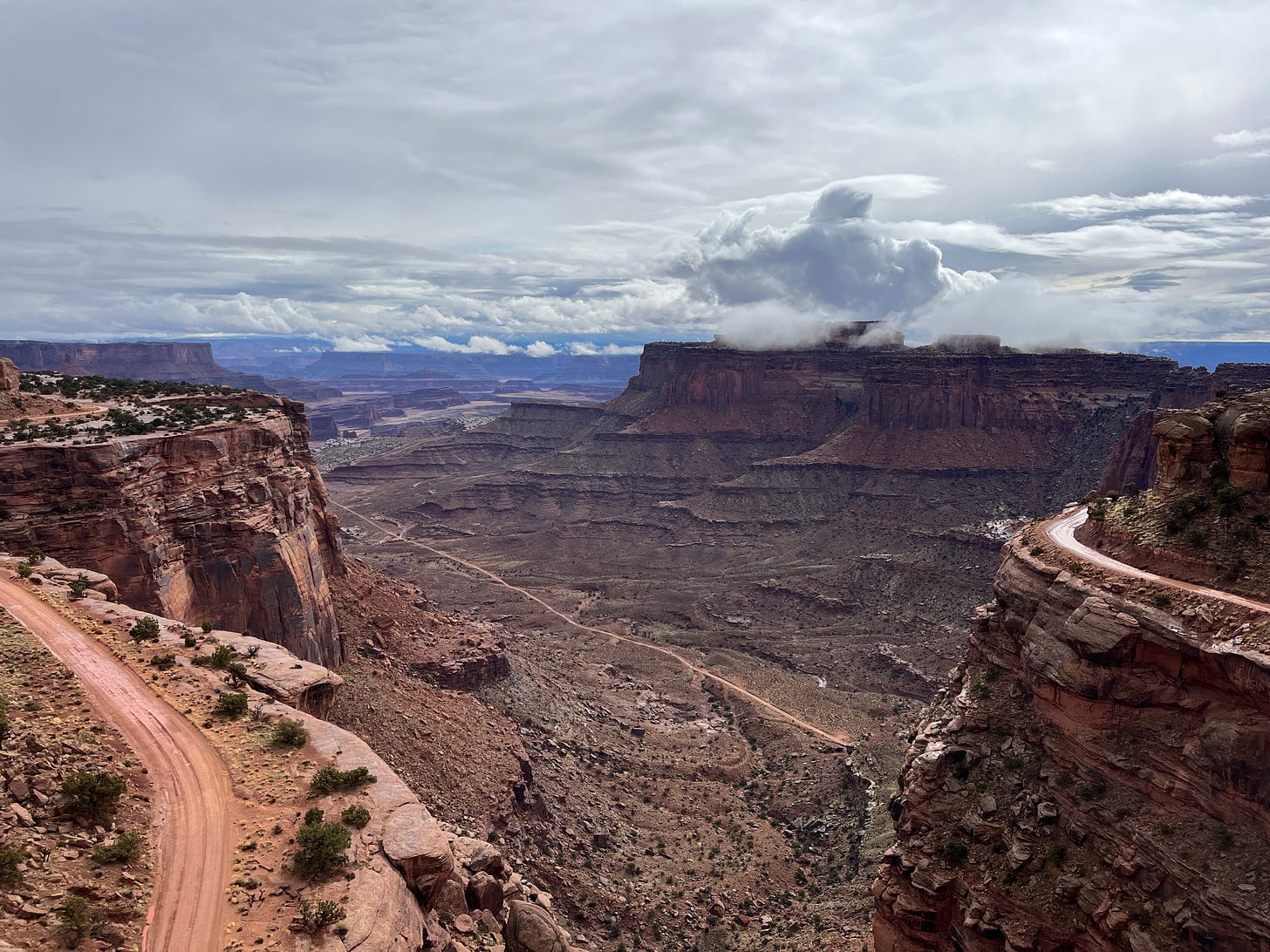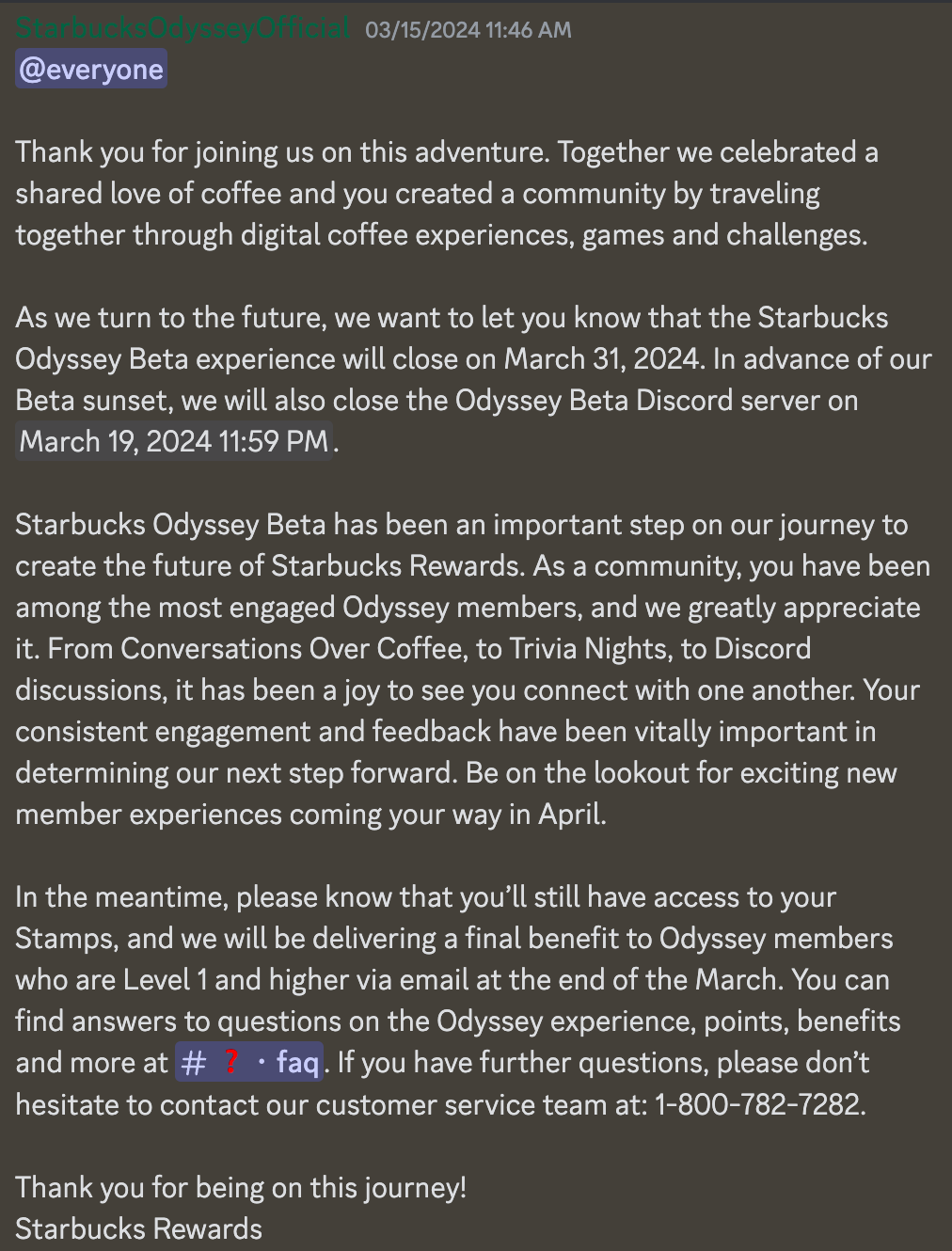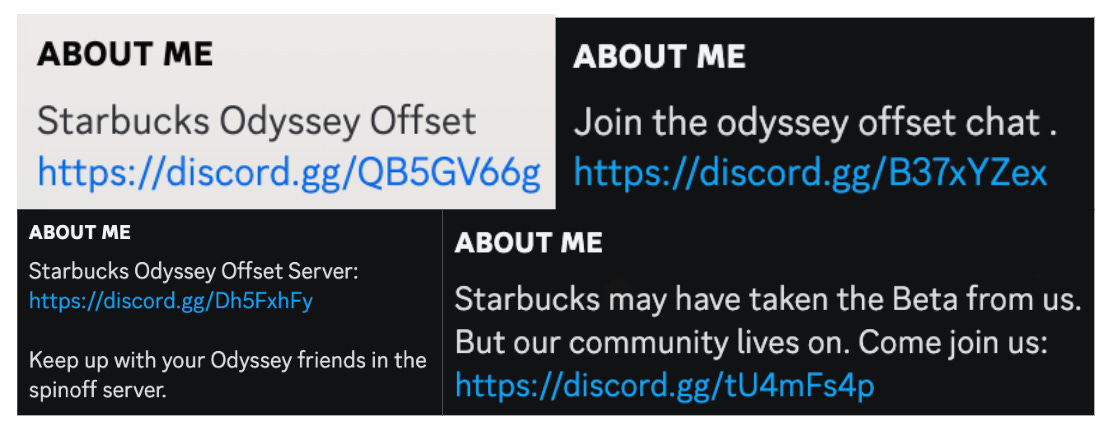I’m back from my friend’s Bachelor Party and I survived! Fortunately, it was one filled with national parks, hiking, and outdoors so I’m not spending this week recovering 😂
Starbucks Sunsets the Odyssey Beta
Last Friday, Starbucks Odyssey members received an email and Discord notification that the Odyssey program would be sunsetting.
Starbucks has been one of the largest brands experimenting with web3, showcasing how loyalty programs could be augmented via NFTs, quests, and community-building. Despite their innovative (by Fortune 500 company standards) approach, the team ultimately decided to shut down Odyssey with the Discord server going offline today and the program concluding at the end of the month.
What do we know?
I would have loved to be a fly on the wall during the meeting(s) that determined the fate of Odyssey. Alas, I can only make some inferences based on public info.
The email
The Discord Announcement
The Discord FAQ
Two ways to look at the situation
There is an optimistic POV on the announcement and there’s a realistic one. Let’s start with the realistic take.
The realistic take
Polygon, Odyssey’s blockchain partner, supported the program’s development with a $4 million incentive. If that pool of funding dries up, the argument to continue operating the program becomes harder to promote within the company.
The program is operationally heavy compared to the established Starbucks Rewards program. The Odyssey team created custom quests, managed a Discord server, hosted AMAs, and created NFT drops for the community. No matter how you slice it, a 2x ROI on an Odyssey stamp sale pales in comparison to a 0.2% lift in conversion for a Starbucks Rewards app notification or email campaign that is sent to millions of phones and emails in an automated manner.
Even if Odyssey’s program showed promising results, scaling Odyssey in its current form 10, 100, or 1000x would have been a challenge. Besides connecting your Starbucks Rewards account to your Odyssey account, it doesn’t make long-term sense to bring millions of users from the established Rewards platform to a web-only experience that is objectively complex compared to a simple transactional loyalty program.
The real reason for sunsetting may be simpler than any of the above points. It’s possible Odyssey just didn’t reach the benchmarks or numbers needed to continue. Unless more details or numbers are publicly shared, we’ll never really know.
The optimistic take
The optimist in me would say that this take is actually a realistic one as well, but I’ll have to suppress that for the time being.
Simply put, the team is sunsetting the Odyssey Beta program to create a more integrated and scalable loyalty program through the established Starbucks Rewards program that has 34.3 million active members in the US. This has already been alluded to in the announcements I shared above:
The Journey Continues
Be on the lookout for exciting new member experiences coming youru way in April
The Starbucks Odyssey Beta must come to an end to prepare for what comes next as we continue to evolve the program.
We are thankful to have had this opportunity to test into these different ways of driving community and loyalty at Starbucks and we look forward to bringing these learnings to a broader audience.
The concept of quests, stamps, and community engagement could live within the Starbucks Rewards app as expanded features instead of a parallel ecosystem. The basic version of quests already exists in the app.
The question I have with this potential direction is would the hypothetical revamped Rewards 2.0 app utilize blockchain and NFTs? Why not just incorporate the concept of quests and stamps without the mess of a marketplace and secondary sales?
The optimistic part of this take is that it seems that the Odyssey Beta was valuable for gaining insights and understanding user behavior in a way that Starbucks hasn’t had before. What’s not so optimistic part of it is the blockchain and NFT portion. I don’t see a clear argument for why Starbucks would want (or at least need) to continue that aspect of the program. And that’s honestly ok, blockchain shouldn’t have to be applied to everything.
Sheesh, this optimistic take took a pessimistic turn 😅
The community’s reaction
As a loyal Odyssey member, I was slightly disappointed by the announcement. After digesting it, I ultimately understood the business decision. Based on my personal experience, it feels like Odyssey was a success in achieving its goals around loyalty. Because of Odyssey, I:
Downloaded the Starbucks Rewards app
Loaded $200 on my Starbucks app to make purchases, something I haven’t done before
Purchased $450 worth of Starbucks stamps and held them
Tried (and enjoyed!) new drinks thanks to Odyssey Journeys. My wife loves the new lavender latte as a guilty pleasure.
Understandably, some community members took it harder than others. What’s undeniable is that a web3-centric approach brings superfans of a thing (brand, product, interest, etc.) together.
Since today is the last day of the Odyssey Discord server, community members popped in to say their goodbyes and reminisce about the good times.
The diehard community members even created a Starbucks Odyssey Offshoot Discord server, continuing the positive vibes and friendships that came from the program. Community members updated their Discord profiles to passively promote the server which currently has 363 members. This was a 👀 moment for me, further emphasizing the “As we look to evolve the program, we are working to have a place for members to connect in the future” bit in the FAQ.
What’s next for brands and web3 loyalty?
The dust hasn’t settled yet so these takes consist of a mix of gut feelings and observations in my time in the space. Who knows, maybe Starbucks will relaunch Odyssey as a separate web3-focused loyalty program. One can dream, right? Lol.
There are multiple web3 playbooks
At this point, there are enough success stories and case studies detailing what generally works and doesn’t work in consumer web3. However, there isn’t enough nuance around the playbooks that have been developed.
We currently have one big playbook with multiple chapters. This should realistically be split into separate playbooks. Some of these chapters are long and full of examples, while other chapters wouldn’t be considered a book on their own.
This image is exaggerated on the left and especially the right side. What’s the definition of ‘successful’ in this context? How can we determine what’s considered successful when some of the most notable brands and projects have only been around for ~3 years (Bored Ape Yacht Club)? Sure they’re promising, but successful outside of the web3 scope? That’s a stretch.
In terms of successful web2 consumer brands entering web3, there are probably only a few pages of best practices in that playbook. Starbucks Odyssey is in there, but no one has cracked the chapters around ‘how do you 100x the program to make it financially viable for a $100B business?’ and ‘why should it be onchain?’ parts for the corporate playbook, at least for now.
Starting from scratch vs. augmenting an existing program
Last August, I wrote What’s Next for Loyalty Programs. In the piece, I make the argument that web3 loyalty is the next logical step for the loyalty space. Reflecting on this in light of the Odyssey sunsetting news, I was overly optimistic with some of the broad sweeping statements. I still believe in those points over a longer time horizon though!
If the web3 loyalty efforts are augmenting an existing program, there are many ways in which the program would fail, due to logical (why does it need blockchain, how do you integrate it into the existing program, incremental operational needs) and frustrating (corporate politics) reasons.
On the other hand, I believe many of the points still stand if the loyalty program starts from scratch. Is there a major consumer brand out there that hasn’t launched a loyalty program yet? And if they were to build a loyalty program on blockchain rails would it flourish vs. a ‘bolted-on’ approach?
Is web3 loyalty an unlock for SMBs vs. corporate brands?
The other angle for web3 loyalty PMF is the company profile. Could web3 loyalty be a better match for SMBs?
Boba Guys, a popular drink chain with 26 locations, launched the Boba Guys Passport program last November, powered by Hang and built on Solana. Hang’s announcement post shared some eye-popping stats, proving web3 loyalty can work.
Another promising example of web3 loyalty is Blackbird, a restaurant loyalty platform created by the co-founder of Resy and Eater. Blackbird is now compatible with dozens of restaurants in NYC and has recently launched in Los Angeles and Charleston.

The real opportunity and unlocks for web3 loyalty might start lower in the food chain (hehe) and that’s ok. Blockchain was meant to be a disruptive technology after all 😉
Let’s see if Starbucks Odyssey comes back in an evolved form later this year. And if not, it was a fun ride.
See you Thursday!
















Little bit sad that they had to shut it down, especially so soon after its launch. Makes you wonder what went wrong exactly. A program which undoubtedly has taken a long time to put together potentially encoutered some unforeseen troubles?
Curious to see if they will revisit web3 at all
I liked very much the analysis with optimistic and pessimistic perspectives